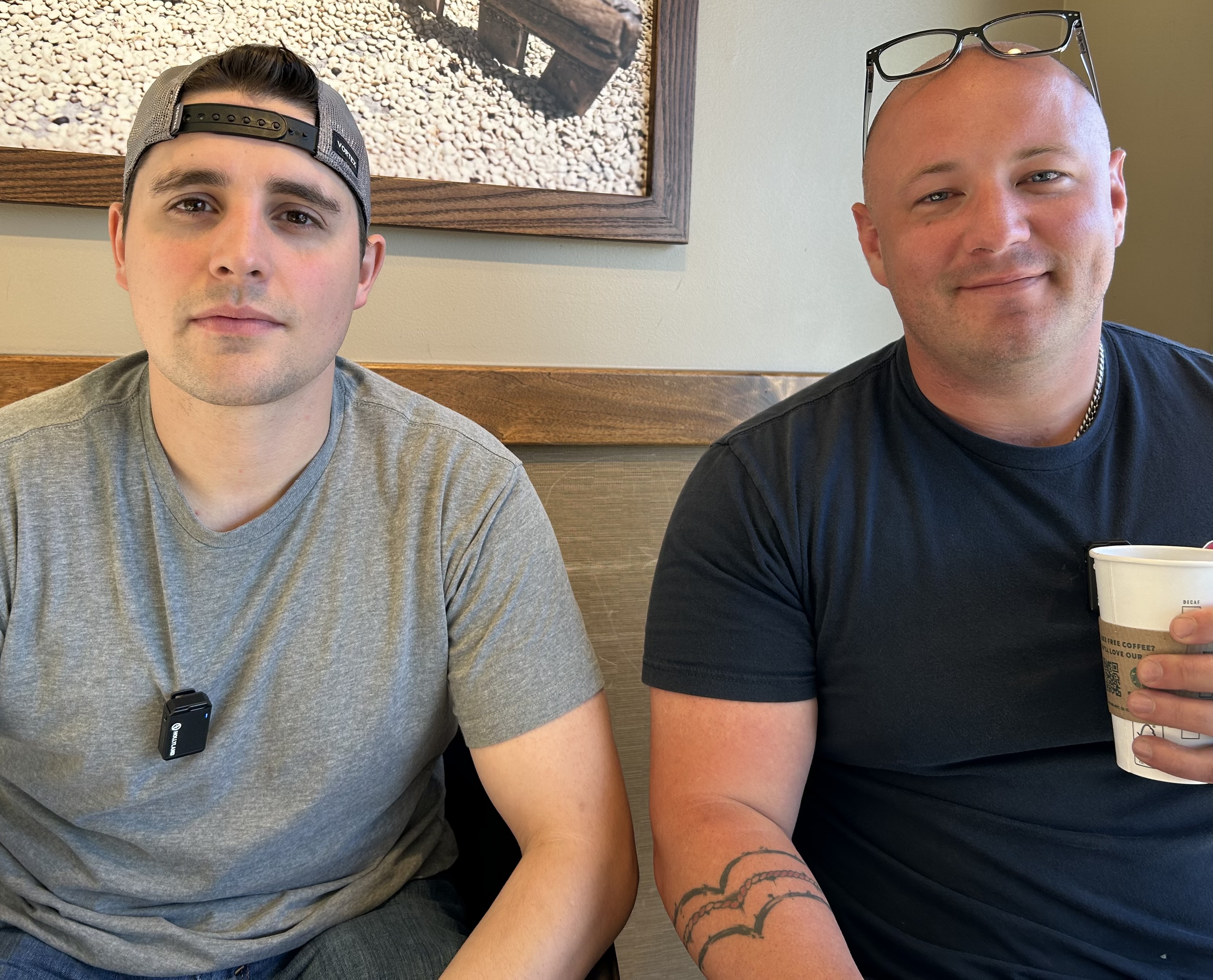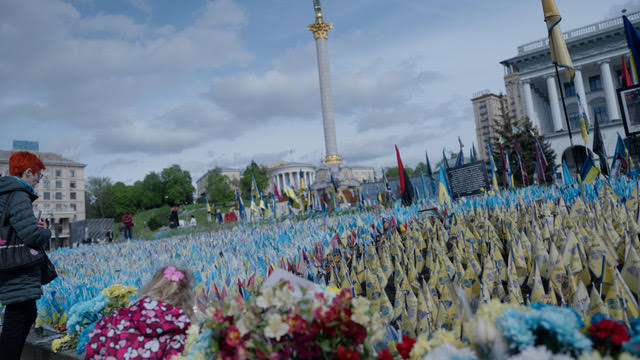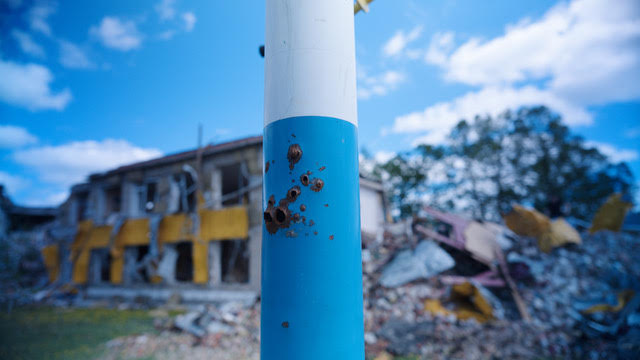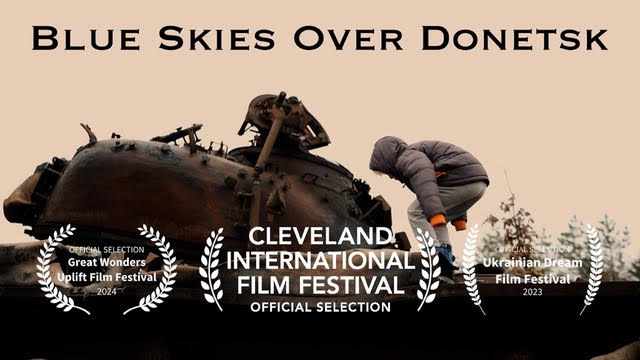OPINION|
Two Springfield firefighters with a love of film and a love of Ukraine have gone to the front lines of the war-torn country and made a 30-minute documentary being shown at film festivals.
Eli Davidson, 26, and Jeffrey Weeks, 35, self-funded the effort and with the blessings of their wives, who were both pregnant at the time the firefighters set off for Ukraine for two weeks in January 2023.
They made their film, then went back to Ukraine for 10 days in April 2024 to do a follow-up project on their film's subject — Andriy Kolbovsky, a Ukrainian man in his 40s with a wife and two young children.
They made the film on their own time and dime.
“We're not full-time filmmakers; we're full-time firefighters,” Davidson says.

“We're both men of faith,” Weeks adds. “It was a prayerful journey for us. And it was kind of like — we're going to push as hard as we can until there's a closed door and until we feel like God's put some kind of blockade in in our way.”
That blockade never came.
“We're fulfilling a calling as well as trying to create a compelling documentary,” Weeks says.
The film's subject was right in front of them
Initially, Kolbovsky was to be their interpreter and liaison. He was making 10-hour drives from Kyiv, the nation's capital, to Donetsk, on the eastern border with Russia. He delivered small stoves to civilians without electrical power and, at times, without a roof over their head.
Kolbovsky, a family man, would encourage those with him to hustle during daylight hours so he could make it to his son's soccer game the next day. Also, he warned, driving at night with lights on would likely make them a target.

Now, Kolbovsky makes similar long drives to deliver generators to military troops.
He is not in the Ukrainian army but faces the possibility of being drafted. Ukraine considers for military service men from 25 to 60.
Once in Ukraine, it took filmmakers little time to realize their main subject was right in front of them — their interpreter.
“Documentary work is incredibly reactive,” Davidson tells me. “We realized he was the subject. He was the story.”
Contribute with a camera and a story
Weeks was the first of the two to be drawn to the idea of a documentary on the war in Ukraine.
“I was looking for a story and my passion for Ukraine came from a missionary in our church that is over there, getting ready to retire, and his whole world got turned upside down with the war. I just begged my church to let me go tell his story. And they're like, there's no way we're sending you to a war zone. Are you crazy?”
Weeks is a captain with the Springfield Fire Department, where he's worked 11 years. Davidson has been with the department five years. Prior to that, he served in the U.S. Marine Corps.
For a brief time, they worked together on the same shift as firefighters. They quickly discovered that not only did they share a keen interest in movies and filmmaking and their Christian faith, but in Ukraine, as well.
Davidson has two younger sisters who were born in Ukraine and adopted by his parents, as well as a brother who was a missionary in Ukraine.
In fact, Davidson had been to Ukraine five times prior to going there to make a movie. On one of those trips, he lived with Kolbovsky and family. The two did church-related work together.
Through Davidson's connections, the filmmakers found a way to get inside Ukraine. You can't fly there.
“We're watching this sovereign state be invaded, civilians being killed,” Davidson says. “We're watching it and wondering, ‘In what capacity can I contribute?' And for us, the way we can contribute is with a camera, with a story.”
Filmmakers felt ground shake when artillery shells landed
The first great surprise, Weeks says, was discovering he could fly from Springfield, Missouri, through Dallas, through London, to Warsaw, Poland for only $700 round-trip.
Once in Ukraine, they duo traveled light. Weeks calls their documentary “run-and-gun” work.
“We needed to be as streamlined as possible when you live out of backpacks,” Weeks says. “We didn't know if we were going to be sleeping on floors or where we would be. We didn't want duffel bags full of gear.”
They were around death but never witnessed it.

“It was all implicit,” Davidson says. “We would see a school destroyed, a kindergarten bombed down, an apartment building a complete shell.”
They often heard and even felt artillery and mortar fire from Russian guns.
“You can hear bombs,” Weeks says. “Sometimes it's very close and shakes the ground. And sometimes it's in the distance, like thunder.”
The film's soundtrack by composer Jimmy Benecasa, a friend of Weeks, works well with the visual imagery.
It is the first documentary film for both Weeks and Davidson. They have not shared it online; doing so likely would disqualify it from some film festival competitions.
Maybe they'll go back, maybe not; wives hold veto power
Weeks and Davidson expect their second film — updating the lives of Kolbovsky and his family — to be better technically.
“Like all things in life, expectation elevates the more you do it,” Davidson says.
They might not return to Ukraine a third time, he says. They have wives and young children and bills to pay. It is dangerous work; this is a war and people are killing each other.
“Our wives have veto power,” Davidson says. “They've been nothing but supportive so far, but they do have the ability to pull the plug.”
Without doubt, the two men say, Kolbovsky is willing to continue to share his story, which is also his nation's story.

In the film, called “Blue Skies Over Donetsk” — Donetsk is an area in Ukraine bordering Russia — Kolbovsky reflects on his country's great struggle as he watches his son Lukian play soccer.
“We have no choice,” he says. “We cannot just run away or disappear from here. This is our land. This is our kids. This is the future of our kids. We don't have any choice. We will fight back. We will rebuild Ukraine. We will maybe win a World Cup soon.”
This is Pokin Around column No. 180.

